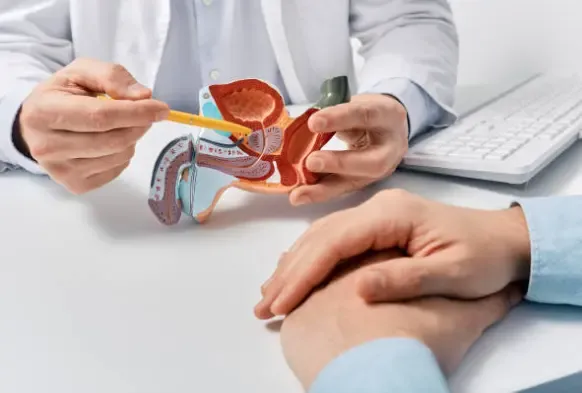Understanding the Enlarged Prostate:
The prostate is a small gland located below the bladder in men. Its main function is to produce fluids that nourish and protect sperm. However, as men age, the prostate can start to enlarge, causing urinary problems. Enlargement occurs when there is an excessive growth of cells in the prostate gland, leading to the constriction of the urethra (urinary passage) and possibly even putting pressure on the bladder.
The Role of Hormones in an Enlarged Prostate:
To understand the development of an enlarged prostate, it is important to examine the role of hormones, particularly estrogen and testosterone. Contrary to popular belief, it is not excessive testosterone but an imbalance between testosterone and estrogen that contributes to prostate enlargement. Estrogen, a byproduct of testosterone, is responsible for increasing the size of the prostate. The enzyme aromatase, produced by the testes and fat cells, converts testosterone into estrogen, leading to prostate enlargement.
Factors Influencing Enzyme Production
Several factors can influence the production of aromatase, the enzyme responsible for converting testosterone into estrogen. Age is a significant factor, as aromatase levels tend to increase as men get older. Additionally, body fat, insulin levels, alcohol consumption, whole grains, and certain medications like hormone replacement therapy or birth control pills can all contribute to higher levels of aromatase and, consequently, an enlarged prostate.
Natural Ways to Inhibit Aromatase
Inhibiting the production of aromatase can help reduce the conversion of testosterone into estrogen, thereby potentially shrinking the prostate. There are several natural methods you can incorporate into your daily routine to achieve this. Let's explore these remedies in more detail:
1. Cruciferous Vegetables
Cruciferous vegetables such as kale, broccoli, cabbage, and arugula have been found to have the capacity to decrease aromatase production. These vegetables contain compounds that help regulate estrogen levels and promote a healthier balance between testosterone and estrogen.
2. White Button Mushrooms
White button mushrooms have also been shown to have aromatase-inhibiting properties. However, it's important to note that the mushrooms should be sautéed rather than eaten raw to fully benefit from their effects.
3. Flaxseed
Contrary to popular belief, flaxseed does not increase estrogen levels. In fact, it can help regulate estrogen by inhibiting aromatase. Incorporating flaxseed into your diet can be a beneficial addition to your enlarged prostate management plan.
4. Green Tea
Green tea is known for its numerous health benefits, and it may also play a role in managing an enlarged prostate. Some studies suggest that green tea can inhibit aromatase activity, potentially reducing estrogen levels and promoting prostate health.
5. Citrus Peel
Citrus peel, particularly lemon peel, contains compounds that have been found to inhibit aromatase and provide various benefits for the prostate and overall health. The peel of a lemon contains five times more nutrition than the juice, making it a valuable addition to your daily routine.
6. Weight Loss and Insulin Regulation
Maintaining a healthy weight and regulating insulin levels can also help manage an enlarged prostate. Excess body fat and high insulin levels can contribute to the production of aromatase, leading to imbalances between testosterone and estrogen. Adopting a healthy keto diet or reducing carbohydrate intake can help decrease insulin levels and promote weight loss.
Tips for Incorporating Remedies into Your Routine
Now that you're aware of the natural remedies for managing an enlarged prostate, here are some practical tips to help you incorporate them into your daily routine:
- Create a meal plan that includes cruciferous vegetables and white button mushrooms.
- Add flaxseed to your diet by sprinkling it on salads or incorporating it into smoothies.
- Enjoy a cup of green tea daily, and consider including lemon peel in your tea for added benefits.
- Seek professional guidance for maintaining a healthy weight and regulating insulin levels.
Remember, consistency is key when incorporating these remedies into your routine. It may take time to see noticeable improvements, so be patient and persistent in your efforts.
Conclusion
Managing an enlarged prostate doesn't have to be a daunting task. By understanding the role of hormones, inhibiting aromatase production, and making lifestyle changes, you can take control of your prostate's health. Incorporate the natural remedies mentioned in this guide into your daily routine, and consult a healthcare specialist for personalized advice. With dedication and the right approach, you can effectively manage an enlarged prostate and improve your overall health.

